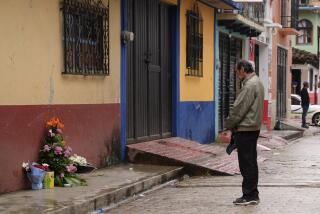Vatican suggests excommunicating Mexican drug traffickers
Reporting from Mexico City — Decrying the violence that Mexicans are enduring, the Vatican has suggested excommunication as a possible punishment for drug traffickers whose war with the government has led to the deaths of thousands of people in the last year.
But the Roman Catholic Church’s severest form of rebuke would probably have little effect on traffickers and killers who lack a religious conscience, the Vatican’s No. 2 official, Cardinal Tarcisio Bertone, acknowledged.
Speaking to Latin American journalists at the Vatican before traveling to Mexico on Monday, Bertone said it was a “duty” to fight drug gangs because their actions represent “the most hypocritical and terrible way of murdering the dignity and personality of today’s youth.”
“Certainly, excommunication is a very harsh deterrent that the church has used to deal with the most serious crimes in its history, from the very first centuries,” Bertone said when asked if the censure would be appropriate. Excommunication bars a Catholic from receiving sacraments and participating in public worship.
“But I should observe that excommunication is a punishment that touches only those who have some form of ecclesiastical conscience, an ecclesiastical education,” he added.
The Vatican, Bertone said, is alarmed at the “disasters” of drug-fueled violence, kidnappings and generalized insecurity in Mexico and, increasingly, in some of its Central American neighbors. He called on Catholics to pray for traffickers to have a change of heart.
Bertone -- whose official title is Vatican secretary of state, making him a kind of prime minister to Pope Benedict XVI -- will be in Mexico for the sixth World Meeting of Families, a church conference that starts this week. His comments were published in Mexican newspapers Monday.
Within the “narco-culture” that surrounds the drug trade here, gangsters make use of a blend of Catholic observance mixed with superstition and their own iconography. For example, many revere the so-called saint of the narco- traffickers, a Robin Hood-type character named Jesus Malverde.
President Felipe Calderon launched the Mexican army a little over two years ago in a nationwide offensive against powerful and well-armed drug gangs. Rather than pacify the country, the conflict has only increased the bloodshed. More than 5,000 people were killed last year alone.
Officially, the church hierarchy in Mexico has been supportive of the government campaign while also urging dialogue and an end to violence. In some parts of the country, however, priests have been willing to accept money from local drug lords to pay for church repairs or other community projects.
“They are very generous with the societies of their towns,” Bishop Carlos Aguiar Retes, president of the Mexican Bishops Conference, said in April, according to the newspaper Reforma. In some remote towns, he said, “they put up lights, communications, roads, at their own expense. . . . Often they also build a church or a chapel.”
The remarks outraged many Mexicans, and church officials later said the bishop was taken out of context. But human rights activists have long complained of complacency by many priests.
“There are seminaries, churches, who accept money not knowing where it came from,” Mercedes Murillo, president of the Sinaloan Civic Front in the city of Culiacan, a major drug-trafficking center, said in a recent interview. “They wash their hands like Pontius Pilate.”
Times staff writer Maria De Cristofaro in Rome contributed to this report.
More to Read
Sign up for Essential California
The most important California stories and recommendations in your inbox every morning.
You may occasionally receive promotional content from the Los Angeles Times.











